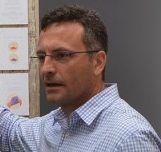
I started out as a High School and Middle School Math and Science Teacher in Brooklyn. I gradually moved on to do research and development as a member of several NSF funded projects at UC Berkeley, and served as the Director of Assessment for the Learning Design Group at the Lawrence Hall of Science. Currently, I am part of POME working toward a Phd in Quantitative Measurement and Evaluation (QME) with a focus on alternative sources of evidence and the models that can handle them. I am also the Research Scientist for Learning Analytics and a past Director at GlassLab Games. At GlassLab Games we use educational data mining techniques, Evidence Centered Design and current principles of game and learning design to rapidly create systems that sense and respond to what kids know and can do. Some of our recent releases include Mars Generation One (argumentation), Ratio Rancher (math) and a SimCity title called SimCity EDU (systems thinking). You can find our work here:
In addition to unobtrusive game-based assessment, my work has also focused on affect detection and its use in tutoring systems through use of hidden Markov models. As a part of the EDRL, I am working on turning “touch into knowledge” – identifying and using patterns in student’s interactions with the Mathematical Imagery Trainer (MITp) to inform the instructional decisions of the system’s virtual tutor. We expect the MITp to become a crucible for research into gesture and embodied cognition.
My aim in all of these projects is to learn how we can make children’s environments more responsive to their needs.
Relevant Publications
Mislevy, R., Corrigan, S., Oranje, A., Bauer, M. I., von Davier, A., Hao, J.,… & John, M. (2014). Psychometric considerations in game-based assessment.GlassLab Report.
Corrigan, S., Burke, T., Pardos, Z. (2015). Dynamic Approaches to Modeling Affect and its Changing Role in Learning and Performance. In User Modeling, Adaptation, and Personalization (pp. 92-103). Springer Berlin Heidelberg.